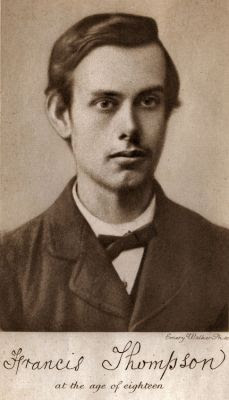 For the first few hours after my post hit the Web, there were no answers to my question, "What poem has inspired you in your religious life?" and I started asking myself, "Don't these people read?!" It was just about when I had started to lose faith (isn't it always the way?) that a trickle turned to a stream, and I can now report to you a fine list of verse and other odds and ends that you might turn to next time you lose faith.
For the first few hours after my post hit the Web, there were no answers to my question, "What poem has inspired you in your religious life?" and I started asking myself, "Don't these people read?!" It was just about when I had started to lose faith (isn't it always the way?) that a trickle turned to a stream, and I can now report to you a fine list of verse and other odds and ends that you might turn to next time you lose faith.First—I should have predicted this—there were Psalms (especially 23) and hymns proposed. Of the latter, my favorite is "For All the Saints," which happens to be the title of my very first post. Another suggestion, "Lord, Who at Thy First Eucharist Did Pray," is new to me, mostly because, unlike "For All the Saints," it is not featured in the Episcopal hymnal from which I sang as a young teen. The reader cited especially this lovely verse, praying for unity:
We pray Thee too for wand’rers from Thy fold;
O bring them back, good Shepherd of the sheep,
Back to the faith which saints believed of old,
Back to the Church which still that faith doth keep;
Soon may we all one bread, one body be,
Through this blest sacrament of unity.
Ferde proposed two items, one of them a poem and both too long to cite, but they're good ones: "The Divine Comedy ought to get a mention here," he wrote. "A little long to post, but what sticks with me is Dante's polling of the population of hell." My fishing buddy (as in fishers of men, usually, we don't catch many real fish) went on: "If I can stray from poetry, James Agee's short novel A Death in the Family is deeply spiritual. I read it over 40 years ago and it's still with me. This novel and Let Us Now Praise Famous Men (with Walker Percy) are Agee's only notable work. He squandered his enormous talent writing movie reviews for The Nation magazine, drinking to excess, and chain-smoking cigarettes. He got out of a cab in New York one afternoon and dropped dead right there on the sidewalk. Not yet 50."
Of the poets cited, Francis Thompson (pictured here) gets a gold star, as The Hound of Heaven is the only poem cited by more than one reader. Father Hopkins (Gerard Manley) is probably the winner, though, not only because I have already written about him here (and all matters of taste on this blog are adjudicated finally by moi-même) but also because readers cited two of his poems, As Kingfishers Catch Fire and God's Grandeur, with its great final couplet ("Because the Holy Ghost over the bent world broods with warm breast and with ah! bright wings"). Meanwhile, I'll give a silver star to W. H. Auden, since I had already written a post on his "Ballad of Barnaby," which triggered this survey, which prompted yet another reader to cite Auden's "September 1, 1939." Said the reader, "It's not what you'd call upbeat, but it's a great portrayal of our constant longing for something better, something which we as Christians find in God."
There were votes for John Donne ("Holy Sonnet XIV"), William Butler Yeats ("Sailing to Byzantium"), G. K. Chesterton ("The Ballad of the White Horse," much too long to cite but available here), and the always perplexing Ezra Pound ("Ballad of the Goodly Fere"). Female poets included Elizabeth Barrett Browning's ("Aurora Leigh") and (sweet!) "my Aunt, Sr. Marie Emmanuel Streit, S.C. (1904-1991) Sisters of Charity of Cincinnati," who wrote "Aspiration":
A wild canary flashes by,
(like arrow sped from unseen bow
To pierce a target in the sky!)
I watch its swift unswerving flight
And think how very glad I'd be
If I could wing as sure a way
O Heart of God, my goal, to Thee!
Finally, ’tis strange, there was a citation from Shakespeare's Macbeth, surely among the darkest of English-language plays but inspiring to at least one Catholic. I'll leave you pondering this bit of verse from the Bard:
But 'tis strange:
And oftentimes, to win us to our harm,
The instruments of darkness tell us truths,
Win us with honest trifles, to betray's
In deepest consequence.
